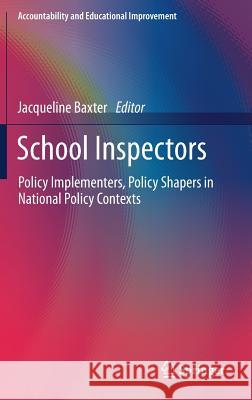School Inspectors: Policy Implementers, Policy Shapers in National Policy Contexts » książka
topmenu
School Inspectors: Policy Implementers, Policy Shapers in National Policy Contexts
ISBN-13: 9783319525358 / Angielski / Twarda / 2017 / 275 str.
Kategorie:
Kategorie BISAC:
Wydawca:
Springer
Seria wydawnicza:
Język:
Angielski
ISBN-13:
9783319525358
Rok wydania:
2017
Wydanie:
2017
Numer serii:
000795140
Ilość stron:
275
Waga:
5.68 kg
Wymiary:
23.5 x 15.5
Oprawa:
Twarda
Wolumenów:
01
Dodatkowe informacje:
Wydanie ilustrowane











